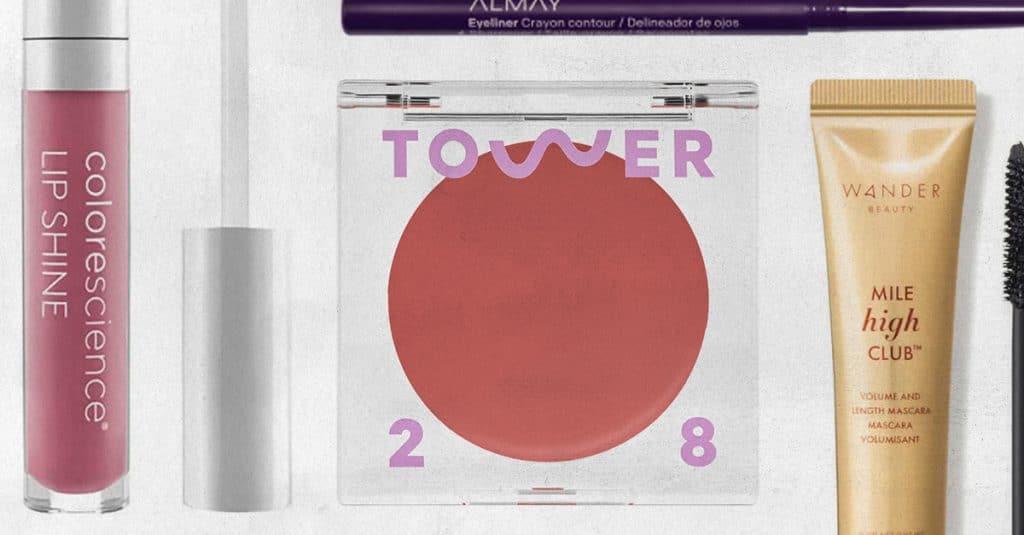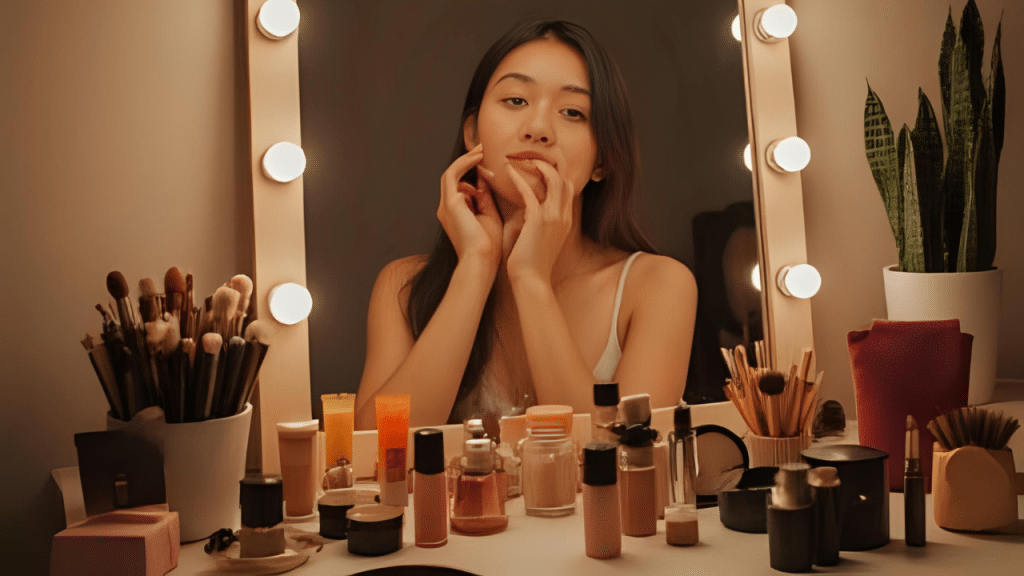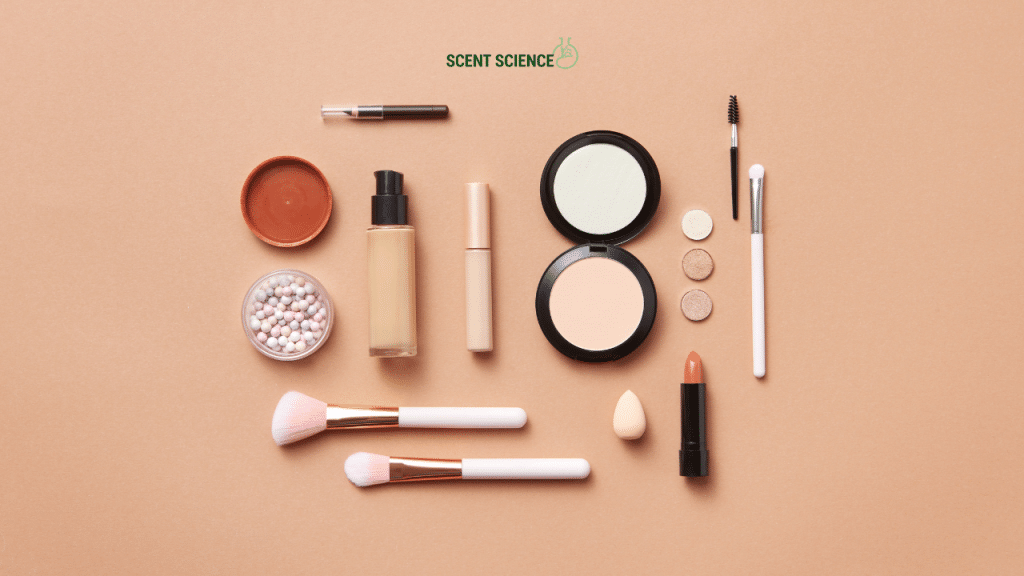While 71% of adults report sensitive skin, a shocking UK study found 74% of products labeled as gentle still contain known allergens. This paradox highlights the complexity in choosing truly hypoallergenic makeup brands that deliver on their promises in 2025.
Critical market insights about hypoallergenic makeup:
- Clean beauty market projected to reach $28.59 billion by 2033
- FDA doesn’t regulate “hypoallergenic” claims – no legal standard exists
- Only 0.03% reaction rate in legitimate clinical HRIPT testing
- $15-75+ price range spans from drugstore to luxury validated options
What you’ll discover about hypoallergenic makeup:
- The exact clinical testing protocols that separate real from fake claims
- Brand tier rankings from medical heritage champions to accessible heroes
- Specific product recommendations across all makeup categories
- Professional dermatologist insights and real patient recommendations
- Future innovations transforming sensitive skin beauty in 2025
Table of Contents
ToggleThe Clinical Gold Standard: What “Dermatologist-Tested” Actually Means
Understanding legitimate testing protocols is crucial for identifying authentic hypoallergenic makeup versus marketing manipulation. The gold standard involves specific clinical procedures that separate credible brands from those making empty claims, crucial for anyone navigating the complexities of fragrance allergens and their health impacts.
Legitimate Testing Protocols for Hypoallergenic Makeup
HRIPT (Human Repeat Insult Patch Testing) represents the most rigorous validation for hypoallergenic makeup. This 6-week clinical protocol involves three distinct phases: repeated applications over three weeks on 200+ volunteers, a two-week rest period, and challenge reapplication to detect sensitization potential.
Essential clinical validations include:
- Allergy panel screening testing against 26-87 known allergens
- National Eczema Association approval – Tower 28’s groundbreaking certification
- Ophthalmologist testing ensuring eye makeup safety for contact lens wearers
- Clinical studies with extended monitoring periods documenting safety profiles
Red Flags in Marketing Claims
Deceptive practices in hypoallergenic makeup marketing:
- “Dermatologically tested” doesn’t guarantee dermatologist recommendation
- “Hypoallergenic” without clinical substantiation or testing protocols
- “Natural” ingredients that commonly cause reactions like essential oils
- Missing transparency about specific testing procedures and results
Legitimate validation indicators: Look for brands citing specific clinical study data, partnership with medical institutions, or certification from recognized allergy organizations like the National Eczema Association. These aspects are crucial in understanding the science behind fragrance allergens and their impact on health.
Brand Tier Rankings: From Drugstore Heroes to Luxury Leaders

The hypoallergenic makeup landscape divides into distinct tiers based on clinical validation, price accessibility, and professional endorsement levels. An intriguing development in 2025 is the rise of solid perfumes, providing new avenues for fragrance exploration in conjunction with makeup products.
Tier 1: Medical Heritage Champions ($20-65)
Clinique maintains its position as the hypoallergenic makeup authority through its 55-year partnership with dermatologists. The brand recently invested $5 million in the Mount Sinai-Clinique Healthy Skin Dermatology Center for advanced allergy research, with every product undergoing extensive clinical validation.
Jane Iredale delivers professional-grade hypoallergenic makeup with 25+ years of dermatologist recommendations. Their mineral-based formulations resist bacterial growth while providing antioxidant benefits and SPF protection, making them favorites in medical offices worldwide.
Colorescience offers dermatologist-dispensed hypoallergenic makeup with comprehensive SPF protection. Their professional-grade formulations earn recommendations for rosacea patients and post-procedure care, aligning with the principles of biocompatible cosmetics designed for healthy skin.
Tier 2: Clean Beauty Innovators ($12-45)
Tower 28 Beauty revolutionized hypoallergenic makeup by becoming the first brand following National Eczema Association guidelines 100%. Founded by eczema sufferer Amy Liu, the brand expanded to 600+ Sephora stores while maintaining strict “#ItsOkayToBeSensitive” standards.
ILIA Beauty, now majority-owned by Clarins Group, combines luxury appeal with active skincare ingredients in their hypoallergenic makeup line. Their “skin that looks like skin” philosophy attracts consumers seeking performance without compromise.
Tarte provides inclusive hypoallergenic makeup with their Shape Tape concealer offering 50+ shades and 16-hour wear for sensitive skin needs.
Tier 3: Accessible Options ($8-20)
Almay remains the original hypoallergenic makeup pioneer since 1931, with doctor-reviewed formulations making quality accessible at drugstore prices. Their commitment includes reviewing thousands of ingredients with development teams and medical professionals.
CoverGirl delivers ophthalmologist-tested hypoallergenic makeup that’s contact lens safe, while IT Cosmetics offers dermatologist-developed formulations with anti-aging benefits.
The Science of Sensitive Skin: Ingredients to Embrace vs. Avoid
Effective hypoallergenic makeup requires understanding which ingredients protect sensitive skin versus those that commonly trigger reactions. The intersection of hypoallergenic fragrances and makeup provides an expanded understanding of ingredient safety.
Common Allergens to Eliminate
Primary culprits in problematic makeup formulations:
- Fragrances containing over 5,000 potential sensitizing compounds
- Preservatives like methylisothiazolinone and formaldehyde-releasing agents
- Essential oils that cause reactions despite “natural” marketing
- Metal components including nickel and cobalt in color formulations
- Specific colorants such as FD&C Red 40 and certain synthetic dyes
The EU now requires labeling for 26 fragrance allergens, expanding to 87 in upcoming regulations, highlighting the scope of potential sensitizers in traditional makeup. This regulatory shift underscores the importance of natural perfume quality control as a benchmark for safety.
Breakthrough Safe Ingredients for 2025
Revolutionary components in advanced hypoallergenic makeup:
- Polyglutamic acid holding 4x more water than hyaluronic acid without irritation
- Advanced ceramides using MVE technology for sustained barrier repair
- Encapsulated peptides delivering enhanced efficacy without sensitization
- Postbiotic byproducts supporting microbiome balance and barrier strengthening
- Mineral UV filters like zinc oxide providing protection without chemical sensitivity
Clinical research shows these innovative ingredients actually improve skin health while delivering color performance, representing the future of hypoallergenic makeup formulation. This aligns with the broader movement toward sustainable and natural fragrance solutions.
Category Champions: Best Products by Makeup Type
Leading hypoallergenic makeup products excel across all categories, offering sensitive skin solutions without performance compromises. In achieving this, many brands incorporate AR tools for testing and allergy management to enhance accuracy.
Foundation Excellence Across Price Points
Budget champion: Almay Clear Complexion Foundation ($13-15) combines hypoallergenic makeup standards with salicylic acid for acne-prone sensitive skin, though limited to 12 shades.
Mid-range standout: Tower 28 SunnyDays Tinted Sunscreen ($30) provides National Eczema Association approval with SPF 30 protection across 14 inclusive shades, earning 4.6/5 star ratings from sensitive skin users.
Luxury leader: Colorescience Tint du Soleil ($55) delivers mineral UV protection with ceramides and peptides, earning dermatologist recommendations for rosacea management.
Eye Makeup Safety Leaders
Mascara innovations in hypoallergenic makeup:
- Tower 28 Make Waves ($20) features AquaFlex technology preventing smudging while meeting National Eczema Association standards
- CoverGirl LashBlast Volume ($8-10) provides ophthalmologist-tested, contact lens-safe formulation with waterproof options
- Clinique High Impact ($24) offers allergy-tested volume with gentle removal
Eyeshadow excellence: Jane Iredale PurePressed ($29) delivers mineral-based color with antioxidant protection, while Tower 28 SuperDew ($20) provides cream-to-powder finish safe for eczema-prone skin.
Complexion Perfectors
Concealer champions in hypoallergenic makeup:
- Tarte Shape Tape ($29) excels with 50+ inclusive shades and 16-hour sensitive skin wear
- Jane Iredale Circle/Delete ($32) incorporates vitamin C and green tea antioxidants
- IT Cosmetics Bye Bye Under Eye ($26) combines full coverage with anti-aging peptides
Color cosmetics: Tower 28 BeachPlease Blush ($20) offers cream formulation meeting eczema standards, while Jane Iredale So-Bronze ($45) provides mineral-based bronzing with SPF protection.
Condition-Specific Solutions: Targeted Recommendations
Different skin conditions require specialized hypoallergenic makeup approaches tailored to specific sensitivities and symptoms. Innovations in this area often integrate AI for ingredient analysis to optimize formulation safety and effectiveness.
Rosacea Management
Specialized hypoallergenic makeup for rosacea:
- Colorescience formulations with calming minerals and comprehensive SPF protection
- Green-tinted primers for redness neutralization without irritation
- Fragrance-free, alcohol-free formulations preventing triggering flare-ups
- Mineral-based foundations providing coverage without inflammatory ingredients
Professional recommendations emphasize gentle application techniques and removal protocols to prevent mechanical irritation during rosacea management.
Eczema and Atopic Dermatitis
Tower 28‘s complete National Eczema Association-approved line represents the gold standard for hypoallergenic makeup addressing atopic dermatitis needs.
Essential considerations include:
- Barrier-supporting ceramide formulations strengthening compromised skin
- Gentle removal protocols using micellar waters avoiding harsh rubbing
- Patch testing requirements before full-face application
- Coordination with treatment ensuring compatibility with prescribed medications
Contact Dermatitis Prevention
Preventive strategies in hypoallergenic makeup selection:
- VMV Hypoallergenics specialized formulations eliminating common contact allergens
- Nickel-free metal components in packaging and applicators
- Preservative-free systems or minimal preservation using safer alternatives
- Single-ingredient testing for individual sensitivity identification
Innovation Pipeline: The Future of Hypoallergenic Technology
Revolutionary advances in hypoallergenic makeup technology promise unprecedented safety and performance for sensitive skin consumers. This forward-thinking approach aligns with the trend towards non-synthetic fragrance options that prioritize safety and environmental concerns.
2025-2026 Breakthrough Technologies
AI-driven formulation enables precision ingredient selection based on individual genetic and skin microbiome profiles, creating truly personalized hypoallergenic makeup.
Advanced delivery innovations include:
- Microbiome integration supporting healthy bacterial balance while delivering color
- Smart delivery systems responding to pH and temperature changes
- Sustainable biotechnology using fermented botanicals and algae derivatives
- Encapsulated actives providing skincare benefits without sensitization
Emerging Testing Protocols
Next-generation validation methods for hypoallergenic makeup:
- Genetic sensitivity screening identifying individual allergen predisposition
- Microbiome analysis enabling personalized formulation recommendations
- Real-time allergen detection technology preventing reactions before they occur
- Continuous skin barrier monitoring throughout product development
Clinical partnerships between beauty brands and medical institutions accelerate innovation while ensuring safety standards exceed current requirements. This collaborative approach is mirrored in the development of herbal care and natural botanical solutions, offering new paradigms in skincare.
Shopping Strategy: How to Navigate the Market Like a Pro

Successful hypoallergenic makeup shopping requires systematic evaluation of claims, ingredients, and clinical validation rather than relying on marketing promises. This is akin to navigating the world of hypoallergenic perfumes, where understanding detailed ingredient lists is crucial.
Research and Validation Checklist
Essential verification steps for hypoallergenic makeup:
- Clinical testing protocols – Look for specific HRIPT or patch testing data
- Dermatologist partnerships – Verify authentic medical endorsements
- Certification validation – Check National Eczema Association or similar approvals
- Ingredient transparency – Review complete formulation details for known triggers
Smart Purchase Strategies
Proven approaches for hypoallergenic makeup investment:
- Start with samples or travel sizes for comprehensive testing periods
- Prioritize multi-functional products combining skincare benefits with color
- Calculate total cost including specialized removal products
- Build gradually rather than complete routine overhauls
Professional guidance: Many dermatology offices maintain hypoallergenic makeup recommendation lists based on patient success rates and clinical experience.
Real-World Performance: Consumer Success Stories and Reviews
Analysis of verified purchase data reveals which hypoallergenic makeup products deliver promised results for sensitive skin users in daily wear scenarios. This data-driven approach mirrors the consumer insights gained from digital beauty trends that inform product development and marketing strategies.
Highest-Rated Products (4.5+ Stars)
Consumer champions in hypoallergenic makeup consistently earning exceptional ratings:
- Colorescience Tint du Soleil – 4.7/5 stars for rosacea management
- Tower 28 ShineOn Lip Gloss – 4.6/5 stars for eczema-safe formulation
- Tarte Shape Tape Concealer – 4.5/5 stars for sensitive skin coverage
Success factors include genuine gentle formulations, inclusive shade ranges, and long-wearing performance without irritation or adverse reactions.
Value Analysis and Long-Term Benefits
Cost-effectiveness considerations for hypoallergenic makeup:
- Medical-grade formulations often provide better value through reduced skin care needs
- Multi-functional products combining SPF, skincare, and color justify premium pricing
- Reduced reaction costs eliminate expenses from treatment and product replacement
- Professional recommendations minimize trial-and-error purchasing mistakes
Consumer testimonials consistently highlight improved skin condition and confidence levels when switching to properly validated hypoallergenic makeup brands.
Frequently Asked Questions
Can I wear hypoallergenic makeup during allergy season?
Yes, but choose fragrance-free, pollen-resistant formulations and remove makeup immediately after outdoor exposure to prevent allergen accumulation.
Do hypoallergenic makeup products expire faster than regular makeup?
Some preservative-free formulations may have shorter shelf lives, typically 6-12 months versus 12-24 months for conventional makeup products.
Will switching to hypoallergenic makeup help my acne?
Hypoallergenic makeup doesn’t necessarily mean non-comedogenic, so look for both certifications if acne prevention is a primary concern.
Are expensive hypoallergenic brands always better than drugstore options?
Not always – Almay and CoverGirl offer excellent clinical validation at budget prices, though luxury brands may provide additional skincare benefits.
How long should I wait between trying new hypoallergenic products?
Allow 7-10 days between introducing new products to accurately identify any reactions and determine which specific product caused issues.
Transform Your Beauty Routine with Clinically-Validated Products
Hypoallergenic makeup has evolved from basic sensitivity management to sophisticated formulations that actually improve skin health while delivering professional-quality results. The 2025 market offers unprecedented choice across all price points, from Almay’s accessible drugstore excellence to Clinique’s medical-grade luxury.
Success lies in understanding clinical validation, ingredient science, and your individual sensitivity profile. Whether managing rosacea, eczema, or general sensitivity, properly formulated hypoallergenic makeup provides both immediate comfort and long-term skin benefits.
Continue exploring fragrance innovation on ScentScienceBeauty.com and discover the role of natural fragrances in preserving food naturally.
Follow us on Social Media for more!
Because sensitive skin deserves makeup that heals while it beautifies.







